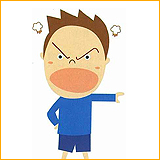| Mental Health Tips | |
| Common Mental Problems | |
| Substance Misuse | |
| Treatment of Mental Disorders | |
| Mental Health Education Pamphlets | |
 Attention deficit and hyperactivity disorder (ADHD)
Attention deficit and hyperactivity disorder (ADHD)
(Special thanks to Dr Quinney Chan of Institute of Mental Health, Castle Peak Hospital, for authoring this article)
Attention deficit and hyperactivity disorder (ADHD) is a common neurobehavioural developmental disorder. Children suffering from ADHD usually present with hyperactivity, impulsiveness and inattention symptoms. The prevalence of ADHD among Hong Kong school children is similar to that of the international figure, which is around 5-9%. It usually affects male more than female.
1. Characteristic of ADHD
2. Causes of ADHD
3. Treatment of ADHD
4. Conclusion
1. Characteristic of ADHD
ADHD children have problems with the following three domains:
A. Hyperactivity
- Fidgety on seat, unable to sit still
- Frequently off-seat
- Run and jump excessively when it is socially inappropriate
- Always 'on the go'
- Talkative and can not keep in silence
B. Impulsiveness
- Continuously chatter or interrupt people
- Blurt out answer before questions were finished
- Have difficulty in taking turns in queue, conversation and game
- Low frustration tolerance
C. Inattention
- Cannot concentrate, take long time to or even fail to complete tasks
- Appear daydreaming when being talked to
- Avoid mental task
- Inattention to small details, frequently make careless mistake
- Forgetful, frequently lose belongings
- Disorganized
Many children are inattentive and restless. This does not necessarily mean they have ADHD. It only becomes a problem when inattention, hyperactive and impulsive symptoms are exaggerated, when compared to other children of the same age, and when the behaviour affects the child's social and school life. To establish the diagnosis of ADHD, adequate symptoms criteria should be present before 7 years old and they should have present for half a year.
2. Causes of ADHD
Up till now, the definite causes of ADHD could not be found. But research points out that the volume of the brain of an ADHD child may be smaller than that of a normal child by 3-5%. This reduction in size is particularly significant for the frontal lobe and temporal lobe. In fact, the frontal lobe is the brain area which is responsible for attention and impulse control. Other research also points out that there may be imbalance in the dopamine system (a type of neurotransmitter in the brain) in patient’s brain.
3. Treatment of ADHD
Medication and behavioural treatment can bring significant improvement over symptoms of ADHD.
i. Medication
Medication helps to correct the dopaminergic and noradrenergic imbalance and hence helps to improve the inattention, hyperactive and impulsive symptoms.
There are two main types of medication which are commonly used in Hong Kong:
- Stimulant medication includes Methylphenidate (Ritalin, Concerta)
- Non-stimulant medication includes Imipramine, Clonidine, Atomoxetine
Stimulant medication-Methylphenidate
Methylphenidate has two forms: the short acting Ritalin and the long acting Concerta.
Duration of Ritalin is around 3-4 hours and usually needs 2-3 doses per day whereas that of Concerta is around 12 hours and usually needs single daily dose.
Results from different researches on stimulant medication indicate that around 65-80% of ADHD children show significant response to stimulant medication e.g. reduced activity level, reduced disruptive and impulsve behaviours and increased attention span.
Side effects of Methylphenidate include the following:
- Loss of appetite
Methylphenidate can suppress appetite especially at higher dosage and at the initiation of treatment. The appetite resumes when the medication effect wanes off. Weight loss as a consequence of loss of appetite can be counteracted by consumption of high energy food. - Gastrointestinal upset
This usually occurs right after the initiation of treatment and it usually spontaneously subsided with days / weeks after starting of treatment. Taking medication after meal can relieve the gastrointestinal upset. - Headache
- Insomnia
Methylphenidate seldom affects sleep if it is avoided at night. Earlier dosing schedule may also relieve the problem. - Tic
Methylphenidate may worsen tic in patient suffering from ADHD and tic condition. However, research has shown that it can still be safely use in these group of patient. - Irritability
It seldom occurs. Reducing the dose or switching to longer acting medication may help to relieve this. - Methylphenidate may lower the seizure threshold in patients suffering from epilepsy.
- Methylphenidate is contraindicated in patients suffering from glaucoma or psychosis.
In general, the side effects of Methylphenidate are mild and transient and they usually improved upon reduction of dosage and rearrangement of dosing schedule.
Some parents may choose to withhold medication during school holiday (Drug holiday). This may help to reduce the influence of side effects but it may also worsen the symptoms in patient. So careful consideration and discussion with doctor is necessary.
B. Non-stimulant medication includes Imipramine, Clonidine and Atomoxetine
This group of medication is usually used as 2nd line agents as these were less well studied by research. These are usually used in children who do not show response to the stimulant group of medication.
Side effects of these medications include:
- Imipramine: Dry mouth, constipation, hand tremor, palpitation. Overdose of imipramine may cause fatal cardiac arrhythmia.
- Clonidine: Dizziness, palpitation, low blood pressure and dry mouth.
- Atomoxetine: side effects are similar to stimulant medication but may be with lesser degree.
ii. Behavioural Treatment
It includes parenting training, behavioural modification programme and impulse control programme etc.
4. Conclusion
Children who receive specialist treatment tailored to their needs may benefit considerably. Some problems with attention and lack of control might continue into adult life. However, with help, most hyperactive children will have settled down by the time they reach their mid-teens. They will have been able to catch up with their learning, improve their school performance and make friends.
Websites with relevant information / Reference
|
================================================================================ Thank you for browsing the mental health tips on the IMH internet. We would like to hear feedback from you through the questionnaire below. Your comments are most welcome for our continuous improvement. |
No. of visitors of this page: 5837


